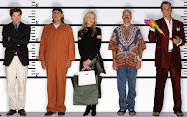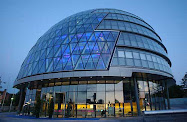 I am going to preface my review by saying that I used to mock my father -- and still do, really -- every time he shouts "I've been there!" during a location shot in movies. Italy, France, Turkey, England... he's been to many a far off lands, so imagine how often I've had to endure the phrase, "I've been there!" But then something happened. He took me to England. He took me to France. And he took me to Italy. So now whenever I see the Gherkin or Piazza San Marco, I exclaim with childish glee, "I've been there!" and he becomes the one mocking me. I went to see Angels and Demons with him yesterday (as well as my equally well-traveled mother), and having walked around Rome with the explicit intent of following the path laid out in Dan Brown's novel, I sat in my seat, squirming and beaming with extreme sensory recognition. Raphael's Chigi Chapel. Bernini's St. Teresa in Ecstasy in Santa Maria della Vittoria. Raphael's tomb and the occulus in the Pantheon. The Baldacchino (which rests above St. Peter's tomb) in St. Peter's Cathedral. Between receiving my undergraduate degree in art history and walking the exact path of protagonist Robert Langdon, I was geeking out throughout the entire movie, suppressing the urge to scream "I've been there!" over and over and over again.
I am going to preface my review by saying that I used to mock my father -- and still do, really -- every time he shouts "I've been there!" during a location shot in movies. Italy, France, Turkey, England... he's been to many a far off lands, so imagine how often I've had to endure the phrase, "I've been there!" But then something happened. He took me to England. He took me to France. And he took me to Italy. So now whenever I see the Gherkin or Piazza San Marco, I exclaim with childish glee, "I've been there!" and he becomes the one mocking me. I went to see Angels and Demons with him yesterday (as well as my equally well-traveled mother), and having walked around Rome with the explicit intent of following the path laid out in Dan Brown's novel, I sat in my seat, squirming and beaming with extreme sensory recognition. Raphael's Chigi Chapel. Bernini's St. Teresa in Ecstasy in Santa Maria della Vittoria. Raphael's tomb and the occulus in the Pantheon. The Baldacchino (which rests above St. Peter's tomb) in St. Peter's Cathedral. Between receiving my undergraduate degree in art history and walking the exact path of protagonist Robert Langdon, I was geeking out throughout the entire movie, suppressing the urge to scream "I've been there!" over and over and over again. With that said, I have no idea if this is a good movie. I walked away feeling pleased, but that's because I've been there and there and there. Some quick notes: First, Ayelet Zurer, who plays the female lead Vittoria, is infinitely better cast than Audrey Tautou in The da Vinci Code. Second, this film is heavy on exposition -- but, unlike Duplicity, the scenes move along quickly and the narrative unfolds at an entertaining pace -- and, although I had no personal dissatisfaction with it, I can understand how anyone unfamiliar with either Rome or art history might get lost along the way. Third, the film starts with a short introduction to CERN and their large hadron collider, which is one of my favorite things ever. The science behind the scene is reductive and oversimplified, but I suppose that's necessary to move the plot along. Still, this allows me a good opportunity to share some links:
• The science behind Angels and Demons, including, while unrelated to the film, whether or not the LHC creates black holes.And lastly, the film explains the Illuminati's mission in one scene, and if you happen to zone out during that scene or leave to use the restroom, you will miss the secret organization's motive. Also, Langdon does not explain -- at all, if I'm remembering correctly -- why the eye, obelisk, or pyramid are associated with the Illuminati. He just says, "An eye within a pyramid! The sign of the Illuminati!" and you're supposed to accept it. On the plus side, the film revisits the science vs. faith dichotomy enough times that even if you don't understand who exactly the Illuminati were, you at least know why they existed.
• Has the Large Hadron Collider Destroyed the World Yet? This is a website to check. Daily.
• CERN's easy explanation of antimatter.
• Some breathtaking photos of the LHC. Who says technology can't also be art?
 The film, of course, made damn sure that it offended neither religious people nor atheists, which actually disappointed me. (Not that the film wasn't insulting, but because there was no real debate between any of the characters.) The head Swiss guard and the camerlengo are quick to point out Langdon's atheism, but he has a private audience with church officials at the end that makes everything copasetic. The political correctness just seemed a little forced. Many members of the papal court -- particularly the head cardinal -- are suggested to have a duplicitous nature (he's religious but with immoral motivations!), but there are many positive conversations about the necessity of faith and religion. As an agnostic, I always appreciated Dan Brown's handling of this debate, and I was sad that my favorite part of the book was not included in the film.(*) In the book, the camerlengo (played in the film by Ewan McGregor) grabs a news reporter's microphone and gives a message to those watching coverage of the papal conclave. Included in that message, he says to the non-believers, "You look at the stars and you say, 'How can there be a God?' I look at the stars and I say, 'How can there not be a God?'"(**) I've always referred back to this scene when people ask me to explain why I'm agnostic (which they incorrectly perceive as "fence-sitting").
The film, of course, made damn sure that it offended neither religious people nor atheists, which actually disappointed me. (Not that the film wasn't insulting, but because there was no real debate between any of the characters.) The head Swiss guard and the camerlengo are quick to point out Langdon's atheism, but he has a private audience with church officials at the end that makes everything copasetic. The political correctness just seemed a little forced. Many members of the papal court -- particularly the head cardinal -- are suggested to have a duplicitous nature (he's religious but with immoral motivations!), but there are many positive conversations about the necessity of faith and religion. As an agnostic, I always appreciated Dan Brown's handling of this debate, and I was sad that my favorite part of the book was not included in the film.(*) In the book, the camerlengo (played in the film by Ewan McGregor) grabs a news reporter's microphone and gives a message to those watching coverage of the papal conclave. Included in that message, he says to the non-believers, "You look at the stars and you say, 'How can there be a God?' I look at the stars and I say, 'How can there not be a God?'"(**) I've always referred back to this scene when people ask me to explain why I'm agnostic (which they incorrectly perceive as "fence-sitting").(*) Although this scene was not in the film, there are other scenes that state quite plainly that science and religion are not, or should not, be contradictory.
(**) I do not have a copy of the book on me at the moment, and I have not read the book in a few years. This is a scene that I pulled from memory, so there is a good chance the wording is entirely incorrect.
I'm fairly certain I enjoyed the film, though I know others may not be as forgiving as I am. Whenever my brain contemplated a plot hole (the set-up of the goose chase is pretty implausible, considering the limitations of the villain), I just remembered Bernini's sculptures. When the movie was over, I ran into a friend who said she was less than impressed, but then, she's never been to Rome.
The Vatican? I've been there.









.jpg)


2 comments:
i thought the movie was enjoyable, however i can see where people who were huge fans of the book are fairly disappointed. so much was moved around (including my favorite line), added and left out.
and really? you liked the chick playing vittoria more than tautou (sp)? she was grating to me. that said, i could have just adored tautou for who she is.
I think I preferred Zurer -- even though she mostly served to reiterate things to the audience, despite her obvious understanding and awareness of what was happening -- because she wasn't set up to be a love interest for Langdon. Also, Tautou just didn't exude charisma or chemistry with Hanks in The da Vinci Code.
Although I am far from being a supporter of Dan Brown, I was surprised at how loyal the film was to the book. They could have changed so much more. As I watched the movie, I kept thinking, "Oh yeah, that happens." Plus, it kept the multiple endings of the novel, despite being a source of irritation for readers.
And what, may I ask, was your favorite line? I assume you're referring to the novel...
Post a Comment